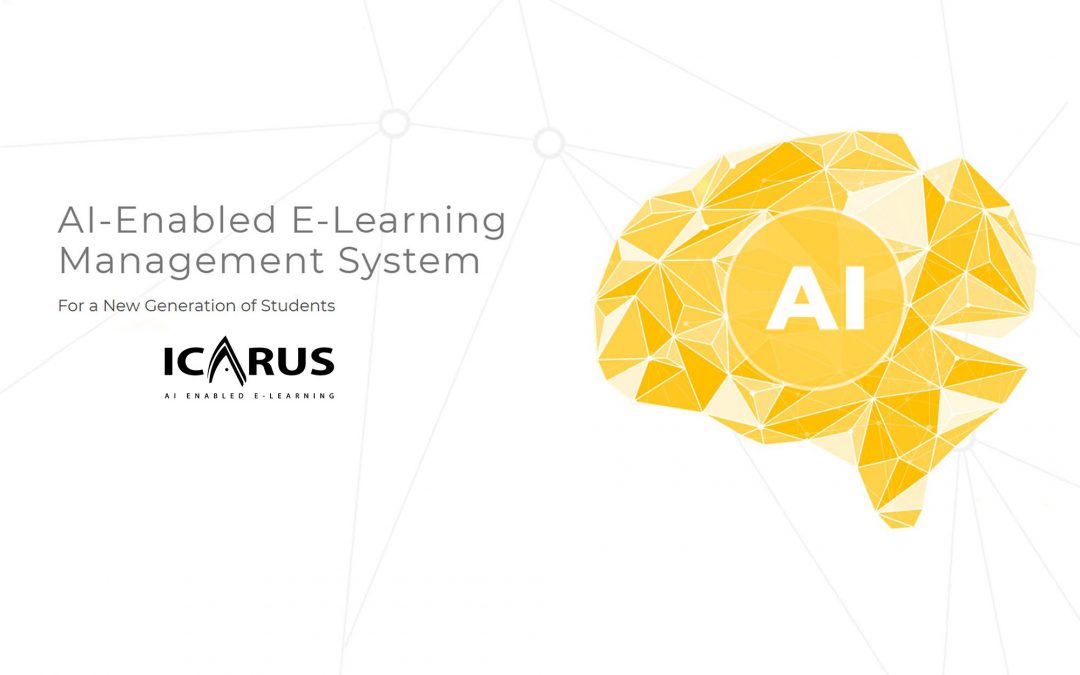Interview available in Spanish
ICARUS, startup with origins in Greece and present in different countries in Europe and America, has developed an Open Source E-Learning Platform based on AI with the objective of empowering and individualizing learning through the use of technology.
Artificial Intelligence has demonstrated, especially in recent years, its advantages and added value in numerous and diverse fields, among which the field of education stands out. ICARUS, taking advantage of the potential of the latest digital technologies, promotes learning in aspects such as the creation of personalized content for each student and management of educational resources or collaboration.
We spoke with its members to learn more about their project and their entrepreneurial experience.
- What is ICARUS? What problems does it solve?
ICARUS is an AI-based E-Learning platform that provides personalized knowledge and additional educational material to students. With an intelligent interface, it suggests additional learning material to both teachers and students, as well as complementary knowledge on different specific subjects.
In addition, it consists of automatic learning elements that allow to assess the different needs of each student. This evaluation makes it possible to focus the training on each type of profile, improving the understanding of the subjects and thus increasing commitment.
In short, the main function of ICARUS is to become a personalized and adaptive tutor after knowing both the student’s profile and his/her pedagogical needs in relation to the educational material he/she selects to assimilate.
- How did the idea of the project come up?
It is a project granted by the European Commission – H2020 that was born as a result of Apogee Information Systems’ commitment to an innovative approach that would have an impact on the students’ learning curve, where advanced pedagogical tools are an indispensable element.
We must be aware that the “E” factor has transformed traditional learning methods. Having adaptive systems allows a much faster and more accurate understanding and distribution of knowledge. Moreover, they can be manually adapted by users, and are also designed to adapt knowledge distribution, learning paths, surveys and to allow interaction with collaborators.
Therefore, this precision brings us closer to Artificial Intelligence E-Learning systems, where adaptation will be more efficient and will consider not only intellectual observations, but also behavioural factors.
- We would like to know more, who is behind this initiative?
The ICARUS team is made up of great professionals distributed in different corners of the world. We are currently operating in countries in both the Americas and Europe, which means that, due to the current situation caused by the pandemic, we do not meet face-to-face as regularly as we used to do before the pandemic. However, this has not been a problem for us to maintain the quality of service, coordinate and keep contact between the different members of the team.
If there is one thing we have in common, it is that we are passionate about developing solutions for the benefit of all.
- Artificial Intelligence is producing new teaching and learning solutions to address some of the biggest challenges facing education today. What are the main advantages of e-learning technologies?
Artificial Intelligence contributes to deepen students´ educational needs. As an example, a student who excels in the subject of finance but, on the contrary, finds the subject of marketing more complex, will avoid or will only try to pass the courses, exercises or tests of marketing. That is why, with the help of Big Data analysis, Artificial Intelligence will guide and provide the student with the pending elements to complete his/her learning cycle.
We live in a world where information is subjective. Most of our experiences are the product of a preconceived idea. Therefore, knowledge must be the star of E-Learning. Personalized access to it is the key to learn faster, support the subjects in which the student does not feel confident, as well as increase their performance and progress.
On the other hand, ICARUS, through AI, provides tools for students to follow their own individual learning paths. Likewise, teachers can also design their own personalized and adaptive tutor with the following subsystems:
– Cognitive comprehension: at the core are the Artificial Intelligence algorithms that merge all available information for the improvement of cognitive comprehension.
– Learning paths calendar: based on the material, performance, preferences and characteristics of the learner’s profile, the algorithms propose learning paths.Profile monitoring: the algorithms also monitor students’ learning patterns.
– Performance Analytics: reports on learner performance and connects elements to understand the type of learning.Business Cases & Social Media Feed: algorithms are based on relevant information from the business world.
– Student and tutor collaboration: by having additional information about the learner, tutors can provide more personalized material and tutoring.
Users will not waste time shuffling through different articles, news, blogs, or other material since ICARUS is be able to reach more than 1,000 possible contents using Artificial Intelligence to offer the best material according to each individual’s needs.
- The education and training system is increasingly part of the digital transformation and European data strategy. Do you think this trend is here to stay? From your point of view, what will education look like in the future?
The pandemic has undoubtedly changed our society. For both students and educators, it has meant the need to turn to digital platforms to facilitate learning and training. In the case of educational institutions, the vast majority have made the transition to online learning because of this situation.
E-Learning has maximized its potential. Webinars, live seminars, offline interaction, video indexing and contextual search have been available for many years. At ICARUS, we are constantly improving the user interface without forgetting the core, which is the learner and his/her individual needs.
In this context, in 2020 the President of the European Commission, Ursula von der Leyen, in one of her speeches mentioned: “This is our approach to Artificial Intelligence: yes, Europe embraces innovation and entrepreneurship. And yes, we are eager to explore the full potential of Artificial Intelligence for our industry and our services. But we will never lose sight of those who should benefit from these technological wonders: our citizens.”
The education of the future will therefore be more objective and personalized. We will be able to overcome all the limitations set by distance, time and cultural barriers. We will focus on learning, adjusting, adapting and executing.
The education of the future will therefore be more objective and personalized. We will be able to overcome all the limitations.
- ICARUS is part of the startup ecosystem of INNOLAB Bilbao. How do platforms like this help to creating an innovation environment?
We firmly believe that, to be successful, a startup must have the following elements as a base: a great idea, efficient management, a solid team, capital, an execution plan and time.
Taking these aspects into account, INNOLAB was a great opportunity for ICARUS to learn from both mentors and their entrepreneurial ecosystem, soaking in their approaches, strategies and sharing knowledge and experiences. Sharing is always a win-win situation.
- What are your short-term business objectives? Where do you see the project in a year’s time?
We aim to complete the current development phase and extend our algorithms to obtain more specific results. In addition, the pandemic has pushed us to include new solutions to the platform.
Our go-to-market plan is solid, and we will begin execution later this year.
You can find more information about ICARUS on their website.

